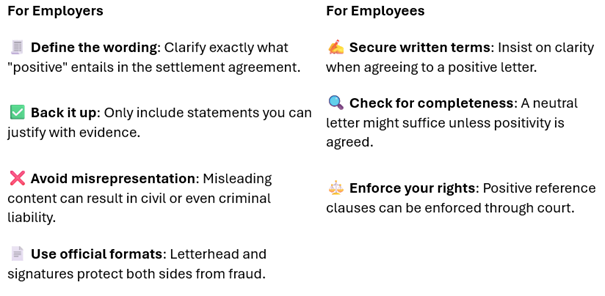When a “positive” employment reference becomes more than a formality
At the end of an employment relationship, issuing a reference letter is often treated as a mere formality. However, under Dutch law (Article 7:656 of the Dutch Civil Code), an employer is legally required to issue such a certificate upon the employee’s request. While the law outlines basic content requirements—such as job title, duration of employment, and hours worked—it does not require the employer to provide a positive assessment.
Nevertheless, in practice, employers often agree to issue a “positive reference letter,” especially when negotiating a settlement. But what exactly qualifies as “positive”? Can such a commitment be enforced? And what are the legal risks for employers?
Legal duty ≠ positive tone
Dutch law mandates the issuance of a reference letter at the end of employment but does not impose a requirement that the content be favourable. The law merely obliges the employer to mention objective facts.
Any positive wording—such as the quality of the employee’s performance or a statement of gratitude—goes beyond this duty and is only binding if contractually agreed.
Once agreed, it’s enforceable
If the parties have formally agreed to a “positive” reference—whether in a termination agreement or in a court-recorded settlement—this becomes a legally enforceable obligation.
In a recent ruling, the District Court of Oost-Brabant (ECLI:NL:RBOBR:2024:5658) found that a neutral letter merely listing tasks and dates did not fulfil the employer’s obligation to issue a “positive” reference, as previously agreed.
Brief background of the case: During an earlier legal procedure, the employee and employer agreed to terminate the employment contract, with the understanding that the employee would receive a “positively worded” reference letter. This agreement was even recorded in an official court report. When the employee later received only a neutral reference at the end of the employment, they returned to court. The municipality (employer) was then ordered to issue a revised, positive statement under the threat of a €1,000 daily penalty.
What qualifies as positive?
- Neutral ≠ positive: A mere list of duties and dates won’t meet the bar if a positive reference was agreed.
- Explicit praise required: For instance, noting that an employee “successfully guided students to exam completion” may qualify as positive.
- Honesty remains key: Employers must avoid exaggerations or misleading claims, even if they contractually promised a positive tone.
Under Article 7:656(5) of the Dutch Civil Code, employers may be liable for damages if the letter includes false or misleading information—or omits critical context in a way that misleads third parties.
Practical guidance

Who decides what’s “positive”?
While employers have discretion in phrasing a performance review, courts may intervene where a positive reference was promised but not delivered.
Importantly:
- Neutrality does not satisfy a positive-letter agreement.
- Employers remain accountable for content—even when employees propose the draft.
Conclusion
A positive reference letter may seem like a small favour, but the legal implications can be significant. Where an agreement includes such a provision, employers should tread carefully.
To minimize risk:
- Agree in writing on what will be included in a positive reference letter.
- Phrase it objectively and truthfully.
- Deliver the letter on company letterhead and with an authorized signature.
- Seek legal advice when in doubt—especially in sensitive dismissals.
Do you have questions about reference letters, termination agreements, or employer liability?
Our employment law team is here to assist.


